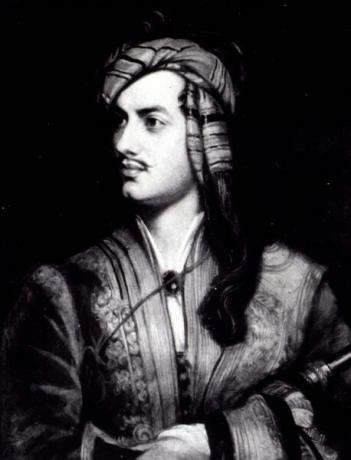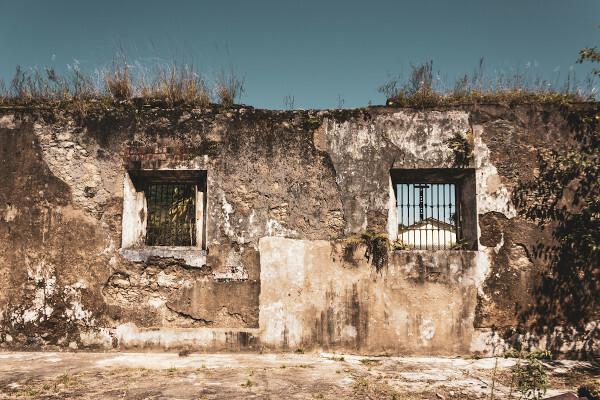Lord Byron, English poet who is a symbol of the artistic and literary movement Romanticism, marked the 19th century with its extremely pessimistic writing, in which death and the ephemerality of life are central themes. In addition to this morbid style, another crucial mark of Byron's poetry is irony, which expresses his critical view of the customs of English society, permeated by constant hypocrisy.
The poet, whose love life was extremely tumultuous, as he was a staunch and flirtatious bohemian, gave him several experiences, which were transposed, in a confessional tone, to many of his verses. It is by him, for example, the famous poem Don Juan, mythical character and symbol of the eternal conqueror.
Read too: Casimiro de Abreu – poet of the second generation of Brazilian Romanticism
Lord Byron Biography

Lord Byron, the name under which he signed his works, was born on January 22, 1788, in London, England, having been baptized with the name George Gordon Byron. He was the son of Captain John Byron and Catherine Byron. As his father died in exile in France in 1791, having spent his wife's inheritance, Byron was raised by his mother. He also had a half-sister, his father's daughter, named Augusta Maria Leigh, who was five years older than the poet.
For being of a noble family, mainly on the maternal part, in 1798, as a child, he received the title of baron. In 1801 he entered the famous Harrow School. From 1805 to 1808 he studied at Trinity College, Cambridge.
He published, in 1806, with his own financial resources, his first book of poetry, entitled Fugitive pieces. In 1809 he held a seat in the House of Lords.
As late as 1809, he traveled to Greece in the company of his friend Hobhouse. On this trip, he fell in love with the daughters of Mrs. Tarsia Macri, especially for her daughter Theresa, who was 12 years old. Theresa became known as the “maiden of Athens”. Back to Athens the following year, Byron stayed at a monastery, where he studied Greek and Italian.
His return to England took place in 1811, the year his mother died. The following year, Byron returned to attend the House of Lords, at which time he joined the liberals. That same year he published his book The Pilgrimage of Childe Harold.
Do not stop now... There's more after the advertising ;)
In 1812, had a fleeting romance with writer Caroline Lamb (1785-1828). Rejected by the poet, Caroline did not accept the ending well and addressed this relationship in her novel Glenarvon, published in 1816. Very flirtatious, Byron, even in 1812, maintained a loving relationship with Jane Elizabeth Scott (1774-1824). In 1813, Byron and his half-sister, who was married, began an incestuous love relationship.
Her half-sister became pregnant, and on April 15, 1814, Elizabeth Medora Leigh was born. Lord Byron, however, did not recognize this paternity, as he was unsure whether or not she was his child. In 1815, Byron married Annabella (1792-1860), who became Lady Byron. The marriage, however, did not work out, owing to Byron's constant financial problems and his bohemian lifestyle, as well as his violent attitudes towards his wife. So, in 1816, she went to her parents' home, taking her newborn daughter with her. Byron, after that, had no further contact with them.
After this termination, Lord Byron moved to Switzerland, where he met the shelley couple, when Mary Shelley (1797-1851) started the production process of the classic Frankenstein.
In 1817, as a result of Byron's love affair with Claire Clairmont, sister of Mary Shelley, a girl was born. That same year, the poet went to Rome, where his friend Hobhouse was. lived all the excesses of an extremely bohemian life. In 1819, the poet was again involved in romantic scandals: he fell in love with Countess Teresa Guiccioli, a young married woman.
Their extramarital relationship lasted until 1823, when Byron he traveled to Greece, where he fought in the country's war for independence.. Lord Byron died on April 19, 1824. As he actively participated in Greece's war for independence, he was considered a national hero in that country.
![Newstead Abbey, England, where Lord Byron resided. [1]](/f/7b5c2f5c7c84cbc4991db4c38bb304cb.jpg)
Characteristics of Lord Byron's work
Lord Byron is considered one of the most important writers of English Romanticism, so his works have many characteristics of this artistic movement, such as:
- idealization of women and love;
- predilection for themes related to death;
- melancholy and pessimistic tone;
- recurrence, in poetry, of a confessional tone;
- presence of a satirical character in relation to certain social and political aspects of English society;
- formal structure tending to narrative in verse;
- presence of a revolutionary posture;
- recurrence of lyrical selves that reveal feelings of guilt;
- Gothic style.
See too: Castro Alves – romantic poet who received the nickname “poet of slaves”
Major works by Lord Byron
- the corsair (1814)
- Minerva's curse (1815)
- The Siege of Corinth (1816)
- The prisoner of Chillon and other poems (1817)
- Tasso's lament (1817)
- Don Juan (1819)
- the bronze age (1823)
Don Juan
Don Juan it is a work that was published unfinished in 1819. It is a extensive poem narrative and satirical in which the author recovers the myth of don Juan, a character portrayed by other authors as the negative image of a seductive and unscrupulous man who seduces defenseless women. Byron, however, gives this figure a new look.
Thus, in the 16 corners that make up Byron's work, Don Juan is a character who gives voice to the criticism of the hypocritical society of the 19th century. This protagonist becomes the lover of Donna Júlia, a married woman. See the following verse from corner 1, in which Byron introduces Don Juan:
Brave warriors, already, since Agamemnon,
They lived and showed their worth,
Some big like it, some less,
But if a bard doesn't do his praise,
Are forgotten. I don't condemn them,
But none of them I can dispose
To my Corner (that is, for tomorrow!).
That's why I turned to D. Juan.
Don Juan, after being discovered by her betrayed husband, boards a ship and suffers a wreck. After managing to survive, he becomes romantically involved with Haidée, the daughter of a pirate named Labro, who sells him as a slave in retaliation for don Juan's attacks on his daughter.
Posteriorly, Juan fights in the Russian army, on which occasion he saves a girl named Leila. After this heroic act, he meets the queen Catherine the Great (1729-1796). He, however, falls ill and is taken back to England, along with Leila. But his fame as a conqueror does not end there. He becomes lovingly involved with other women, thus maintaining his reputation as an eternal conqueror.
Read too:Iracema - Brazilian romantic novel written by José de Alencar
Poems by Lord Byron
A cup made from a human skull
Don't fall back! The spirit is not gone from me...
In me you will see - poor cold skull -
The only skull that, instead of the living ones,
It just pours out joy.
Live! I loved! drank which you: in death
They ripped my bones out of the ground.
Don't insult me! fly me... what a larva
It has darker kisses than yours.
Better to save the juice from the vine
Than the ground worm be a vile pasture;
– Cup – take the drink from the Gods,
That reptile pasture.
That this vessel, where the spirit shone,
Let the spirit light up in others.
There! When a skull no longer has a brain
…You can fill it with wine!
Drink while there's still time! Another race,
When you and yours go into the ditches,
May the hug free you from the earth,
And drunkenly rejoicing to desecrate your bones.
And why not? if in the course of life
So much evil, so much pain there rests?
It's good running away from the rot on the side
Serving in death finally stops something...
(Translation by Castro Alves)
In the poem “A cup made from a human skull”, some striking features of Lord Byron's style are evident. O me lyric addresses a skull, expressing reflections on the ephemerality of life, as noted in this verse: "Drink while there is still time!"
The very choice of this interlocutor denotes the presence of another theme dear to Byron: death. In Brazil, this style of poetry was cultivated by Álvares de Azevedo, main poet of the call Ultraromanticism.
Ines
Don't smile at my somber forehead,
There! smile i can't again:
May the sky take away what you would cry
And in vain might you cry, just.
And questions that I bring secret pain,
To gnaw on my joy and youth?
And in vain do you try to know my anguish
That neither would you make it less rude?
It's not love, it's not even hate,
Nor low-ambition lost honors,
that make me oppose my state
And evading me from the dearest things.
From everything I find, hear, or see,
It is this boredom that derives, and how much!
No, Beauty does not give me pleasure,
Your eyes have barely charm for me.
This immobile and endless sadness
It's that of the wandering and fabulous Jew
Who will not see beyond the grave
And in life you will have no rest.
What an exile – can he run away from himself?
Even in more and more distant areas,
The plague of existence always chases me,
Thought, which is a devil, before.
But the others seem to carry themselves
Of pleasure and, what I let, enjoy;
May you always dream of these raptures
And how I wake up never wake up!
For many climates my fate is to go,
Away with a cursed recall;
My comfort is to know that it occurs though
Whatever happens, the worst has already been given to me.
What was that worst? Do not ask me,
Do not search for what I dismay!
Smile! don't take the risk of unraveling
A man's heart: inside is Hell.
(Translation by Castro Alves)
In this poem, the lyrical self has as interlocutor “Inês”, possibly a woman who was his passion, but no longer, which is inferred from lines like this: “Your eyes barely have any charm for me”. The poem, therefore, has a pessimistic tone, which is noticed throughout all the stanzas, as in the verses: "My comfort is to know that it happens even though / Whatever happens, the worst has already been given to me." This pessimistic view of love is materialized at the end of the poem, when the lyrical self synthesizes its thought with the following maxim: “do not take a risk in unraveling / The heart of a man: inside is the Hell".
See too: 5 best poems by Fernando Pessoa
![Lord Byron was regarded as a national hero in Greece. Pictured, Greek stamp commemorating its 150th anniversary. [2]](/f/6ce67d24011cd2c4dce38ad9c24a3e7a.jpg)
Lord Byron's Phrases
- "Everyone who gets the joy must share it."
- “Life is like wine: if we want to enjoy it well, we shouldn't drink it to the last drop.”
- “The memory of happiness is no longer happiness; the memory of pain is still pain.”
- "Love is born of little things, lives from them and sometimes dies by them."
- "It's easier to die for a woman than to live with her."
- "Eat, drink and love: the rest, what good would it do us?"
- "It's when we think to lead that we are usually led."
- “And after all, what is a lie? It's just the masked truth.”
- "All times, when passed, are good."
Image credits
[1] Nahlik / Shutterstock
[2] Lefteris Papaulakis / Shutterstock
By Leandro Guimarães
Literature teacher



